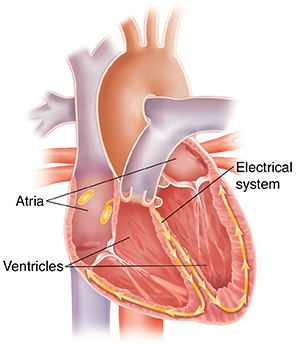Understanding Second-Degree Heart Block
Understanding Second-Degree Heart Block

Heart block is a condition in which the electrical wiring system of the heart does not work properly. Sometimes it can result in a slow heartbeat that is either regular or irregular. This may cause symptoms.
Two different types of electrical problems are considered second-degree heart block. With the first type, electrical signals take longer and longer to move from the upper chambers of the heart (atria) to the lower chambers (ventricles). At times, it takes so long that the process does not complete. This results in a missed heartbeat and an irregularity in the pulse.
With the second type of second-degree heart block, some electrical signals are not relayed from the upper chambers to the lower chambers. Unlike the first type of second-degree heart block, the electrical signals suddenly fail to conduct. This failure to conduct may happen in a very regular pattern and cause missed heartbeats.
What causes second-degree heart block?
Second-degree heart block may be caused by:
-
Natural aging process
-
Damage to the heart from surgery
-
Damage to the heart muscle from a heart attack
-
Other types of heart disease that damage the heart muscle
-
Low thyroid levels
-
Electrolyte abnormalities
-
Inflammatory or infectious heart conditions
-
Other diseases, including rheumatic fever and sarcoidosis
-
Some medicines
In addition, some babies are born with heart block. Heart block may also run in families.
What are the symptoms of second-degree heart block?
Second-degree heart block may not have symptoms, but often it does. Symptoms may include:
-
Lightheadedness, faintness, or dizziness
-
Feeling tired
-
Shortness of breath
How is second-degree heart block treated?
Second-degree heart block without symptoms may not need treatment. Your healthcare provider is likely to ask you to have regular follow-up visits. You may also be asked to take your own pulse and be alert to changes in your heart rate.
Treatments for second-degree heart block with symptoms include:
-
Taking medicines to increase your heart rate in the short-term (acutely) to relieve symptoms
-
Stopping medicines, if they are causing the heart block
-
Getting a pacemaker
Most people who have the second type of second-degree heart block will need a pacemaker even if they have no symptoms. This type of heart block often can progress to more serious type of heart block that can be potentially dangerous.
What are the complications of second-degree heart block?
Second-degree heart block may develop into a more serious type of heart block. It may cause a sudden loss of consciousness or it may cause the heart to suddenly stop beating.
When should I call my healthcare provider?
Call your healthcare provider right away if you have any of these:
-
Unusual tiredness
-
Shortness of breath
-
Chest pain
-
Weakness, dizziness, or fainting
-
Unusual drowsiness or confusion
-
Pain that gets worse
-
Symptoms that don’t get better with treatment, or symptoms that get worse
-
New symptoms
Updated:
March 16, 2019
Sources:
Ferri F. Heart Block, Second Degree. In: Ferri F, editor. Ferri's Clinical Advisor 2016. Philadelphia: Elsevier; 2016. p. 570-1., Sauer WH. Etiology of atrioventricular block. Up To Date. October 30 ed: Up To Date; 2014. p. 9., Sauer WH. Second degree atrioventricular block: Mobitz type I (Wenckebach block). Up To Date. December 21 ed. Up To Date; 2015. p. 22., Sauer WH. Second degree atrioventricular block: Mobitz type II. Up To Date. December 21 ed: Up To Date; 2015. p. 21.
Reviewed By:
Steven Kang MD